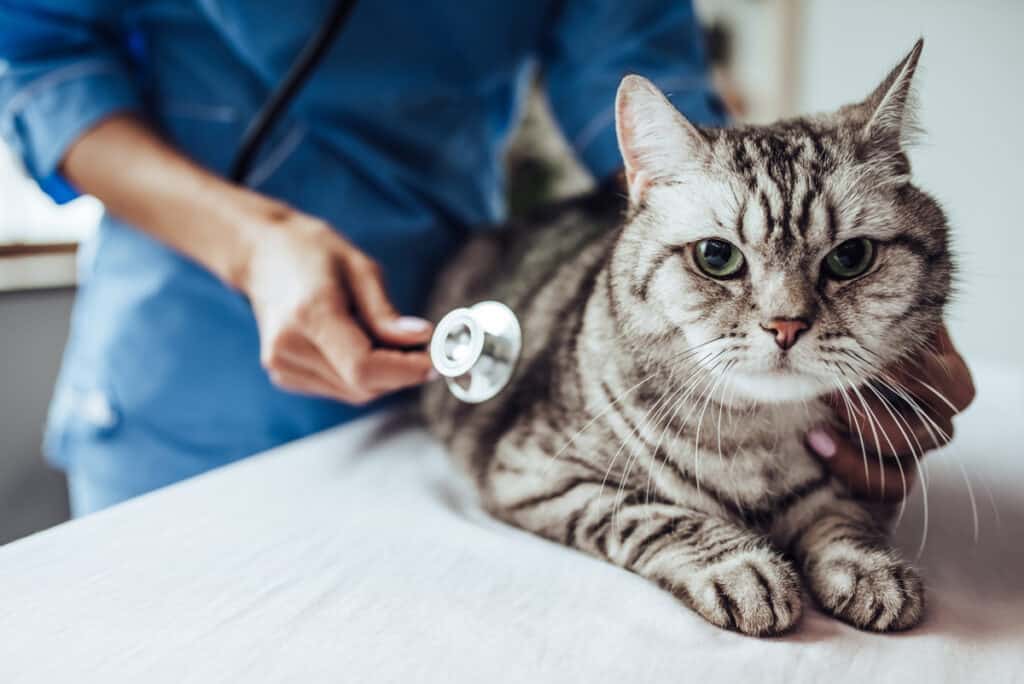Cats, like every other pet, need regular checkups to ensure they remain healthy. However, as a pet parent, sometimes you’re left wondering how often you should take your feline to a vet. The good news is that you aren’t alone in this.
A lot of people tend to assume that cats require fewer vet visits compared to dogs, which isn’t true. Even healthy cats should see the vet regularly for checkups and necessary vaccines.
How often does a kitten need to see the vet?
If your cat just recently blessed you with kittens or if you have adopted a very young kitten, make sure you schedule a visit with the vet as soon as possible. The first vet visit is always important not only for you but your cat as you get to discuss various issues with your veterinarian.
For four months old kittens or less, monthly vet visits are recommended. Your kitten will get vaccines starting from when they’re 6-8 weeks old.
Your vet will also provide a physical examination and weigh your kitten to make sure they are growing at a healthy pace.
Spaying/Neutering
Most adoption agencies and animals shelters in the United States won’t release kittens for adoption until they have been fixed.
What is the minimum weight for neutering or spaying a kitten?
However, in certain cases, you may end up with a kitten that hasn’t been fixed. When we adopted our black cat, she was released to us unfixed because she was a runt and was too small for the operation. She was 1 1/2 pounds at three months old when we adopted her. We ended up bringing her to our vet to be spayed once she weighed enough for the operation.
Cats can be spayed when they are as young as six to eight weeks old as long as they are at least two pounds in weight. Female kittens can go into heat as young as four months old so it’s a good practice to spay your female kittens early to prevent unwanted pregnancies.
If you adopt an unfixed kitten, be sure to keep them indoors and way from intact cats to prevent unwanted pregnancies and have them spayed or neutered as soon as possible.
A young healthy adult cat
Adult healthy cats should visit the vet for regular checkups despite their healthy lifestyle at least once a year. Most of these checkups will see your healthy feline getting vaccine boosters, dental cleanups, and various inspections.
Also, the visits will help your vet to check for any developing problems that can be more easier addressed at the early stage.

What does the veterinarian do during my cat’s annual checkup?
When you visit the vet for their annual checkup, your vet will examine their teeth, check in their ears and eyes, and do a physical examination that checks their entire body for health issues. Your vet will use a stethoscope to listen to your cat’s lungs.
Your vet will also ask you if you have any concerns about your cat. Your cat’s weight and temperature will also be recorded. The temperature most likely will be taken using a rectal thermometer. Finally, any deworming and vaccines will be administered.
All of these can help your vet assess your cat for signs of the state of their health, grooming, and pain.
At the end of your cat’s checkup, you will received an itemized printout with a list of the vaccines that were given, your cat’s age and weight, along with a schedule of when you need to return for the next visit.
When should a recently adopted cat be taken to the vet?
Most cats from adoption agencies and animal shelters will administer medical treatment. Depending on their age, these adopted cats will have been spayed or neutered and been giving heart worm treatments. The agency should also provide you with a list of the dates and vaccines that had been administered as well as a schedule of when you need to continue to vaccination course.
I always prefer to schedule a checkup with my vet shortly after adopting a new cat or kitten. For me, this provides a once over to make sure the cat is healthy and will receive any treatments if there are any medical issues.
Cats and kittens that are adopted out of facilities with large numbers of other animals are prone to picking up respirator illnesses or other ailments such as ringworm. A trained professional will give your new addition a careful examination to make sure they are in good health.
Senior cats and vet visits
When your cat hits the 7-year mark or even older, your vet is most likely to change their professional care schedule. So, if for instance, they have been visiting a vet twice a year, the number of visits can change to three times a year, or remain the same depending on their general health.
However, you should be ready for more vet visits once your cat gets to 10 years, when they are considered geriatric. However, the number of visits depends on various common old age cat health issues such as arthritis, obesity, or kidney and liver issues, which normally require comprehensive treatment.
What is the purpose of the vet visits for a healthy cat?
Your cat should ideally visit a vet every year, even when healthy, for general wellness exams. This will help your vet understand them better. From their weight to normal behaviors, this will help them know how to handle your cat in case of emergencies.
Also, these kinds of checkups help your veterinarian to notice any illness early for better intervention measures.
Vaccines
As mentioned earlier, vaccines are an important part of your cat’s life. From when they’re a few weeks old, they will need to be vaccinated for their well-being prevent illness that can be picked up from other animals, fleas, and parasites.
There are various types of cats vaccines to protect them against serious and potentially life-threatening diseases.
Do indoor cats need vaccines?
Even for indoor cats, vaccines to protect agains the following illnesses are recommended:
Panleukopenia (feline distemper) vaccine to protect against a highly contagious and lethal virus.
Calicivirus vaccine to protect against this widespread and contagious virus that can cause upper respiratory illness.
Rabies virus: this infectious virus can be lethal if not vaccinated against. Skunks, raccoons, coyotes, foxes, and bats are common carriers of the rabies virus which is transmitted usually by being bitten by an infected animals.
What other vaccines are needed for outdoor cats?
Additional vaccines may be recommended by your vet depending on prevailing diseases in your area and whether or not your cat has access to the outdoors to protect against:
Feline Immunodeficiency Virus (FIV) to protect your cat from the immunodeficiency virus.
Feline Leukemia Virus (FeLV) which spreads via contact with infected cats.
Bordetella bronchiseptica (kennel cough) is a bacterial infection which can cause upper respiratory illnesses.
Chlamydia felis is a bacterial infection that can result in conjunctivitis and upper respiratory infections in cats.
Always consult with your veterinarian about the appropriate vaccines and vaccination schedule for your cat.
How the vet can help you prepare for changes in your cat’s life
If you are planning on moving or are about to experience some significant changes in your life, you might want to visit the vet. Your vet will advise you on how to handle your cat during these changes, and if there is anything that they need to make them more comfortable or protect them against infections.
For instance, when moving to a new location, your veterinarian will be in a better position to advise on any additional vaccines your cat might need. This is especially important if they are going to be allowed outdoors where they can come into contact with other animals.
However, if you just moved to a new area, and your cat seems to behave strangely, a visit to a vet will detect whether it’s anxiety they’re dealing with or any physical illness.
When should you be concerned and take your cat to the vet otherwise?
The best time to take your cat to a vet is the minute you notice anything strange with them. The truth is, no one knows your cat better than you. So, if you’re feeling like there is something not right with them, consult with your veterinarian.
Some common ailments that may require a consultation with a veterinarian for medical assistance are:
Urinary tract issues: you will easily notice this as a frequent urge for your feline to urinate, noticeable pain when urinating, and/or the inability to pass the right amount of urine( when you notice unusual small liquid passage)
Fleas/ticks/worms: cats hate pests. Fleas are a common occurrence in cats. They not only make them uncomfortable but can also quickly spread throughout your household. The same case applies to ticks and worms. So, always take your cat to the vet immediately you notice a flea or tick on their skin, which will mostly cause them to scratch their skin or want to rub against you or items around the house.
As for worms, your cat should have a regular deworming schedule. However, if you seem to forget or notice traces of worms in their poop, it’s time to schedule that much-needed appointment.
Coughing/runny nose/sneezing: if your cat is exhibiting cold/flu signs, you should take them to see a specialist. Never try to self-medicate, as you never know the cause of the problem.
Vomiting and Weight loss: cats vomit because of an underlying issue that can only be diagnosed by a vet. Also, drastic weight loss should be checked by a specialist to identify and treat the root cause.
Changes in eating/drinking/elimination habits: are a clear indication of underlying issues that should be dealt with by a vet.
Other common cat signs that you cat needs medical attention can include frequently avoiding the litter box, excessive licking and grooming, or incessant howling.
References
Beers, H. (2018, August 13). Cats need yearly checkups, year-round enrichment. Veterinary Medicine at Illinois. https://vetmed.illinois.edu/pet-health-columns/cats-need-checkups-enrichment/
Feline vaccines: Benefits and risks. (2018, July 23). Cornell University College of Veterinary Medicine. https://www.vet.cornell.edu/departments-centers-and-institutes/cornell-feline-health-center/health-information/feline-health-topics/feline-vaccines-benefits-and-risks






